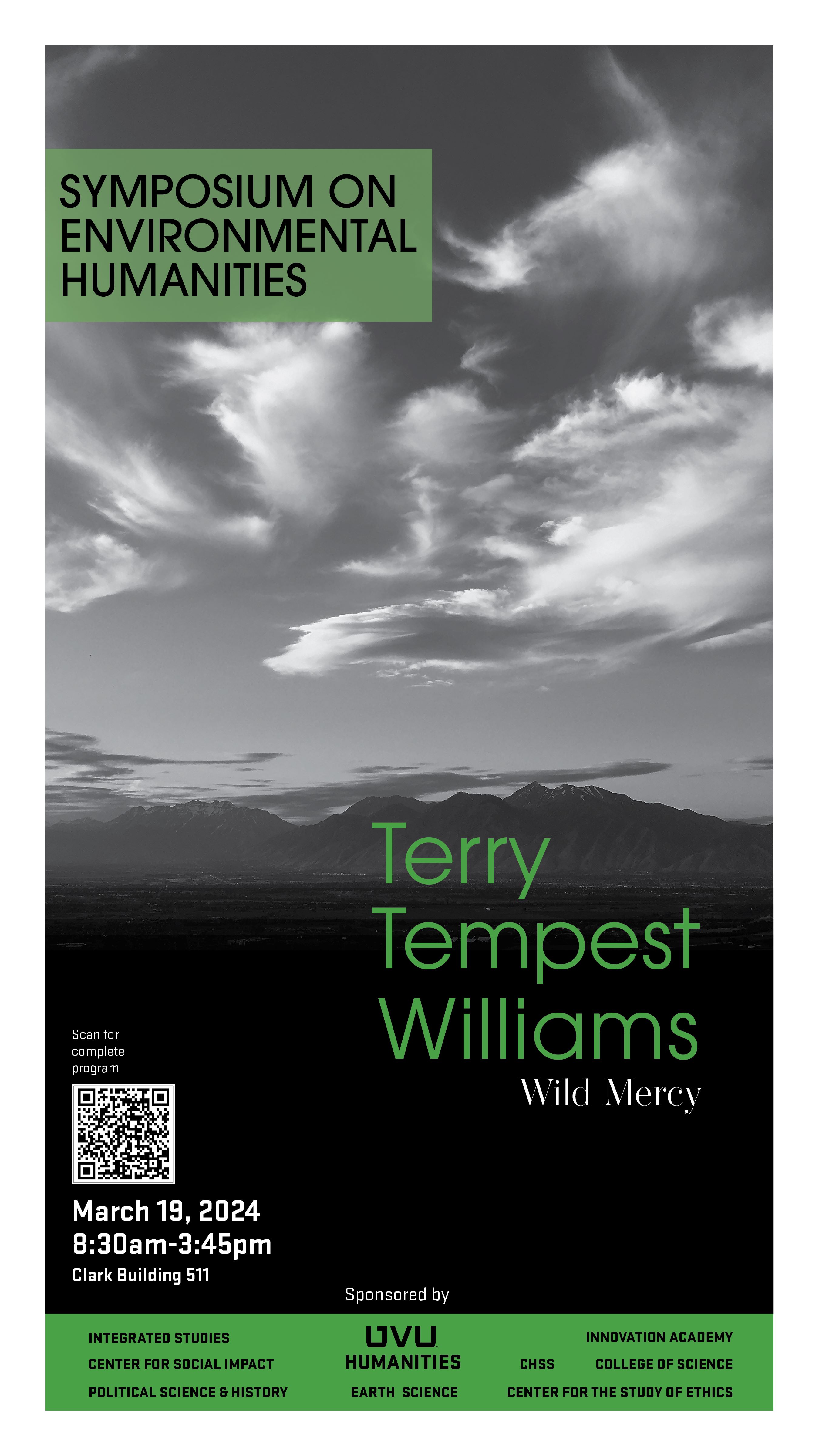In 2023, the UVU Board of Trustees approved a new Bachelor of Science degree in Humanities. This now allows our majors to substitute the substantial second-language requirements of a traditional Bachelor of Arts degree to pursue emphases like medical humanities, business humanities, environmental humanities, etc. These new possibilities further emphasize the uniquely interdisciplinary nature of our program. To introduce and celebrate the new degree possibilities, we are pleased to announce that Writer, Environmentalist, and Educator Terry Tempest Williams will offer the keynote speech for this year’s Symposium on Environmental Humanities. Her topic is “Wild Mercy.”
Great Salt Lake is a substantial focus of this symposium. Ecologist Ben Abbott will speak about our lake in the context of other saline lakes threatened by over-consumption of the water that should feed the lakes. Terry Tempest Williams, whose early book Refuge featured Great Salt Lake at a time of crisis, will explore the potential effect of extending personhood to Great Salt Lake: what might a different kind of power look like, feel like, if we extend power to other species? Botanist Sam Rushforth will discuss growing up in the proximity of Great Salt Lake and his decades-long professional work sampling the lake for water-quality issues. Composer Matthew Durrant will present his sound composition Arsenic Requiem, a work that tells the story of the Lake and how it has been altered, sickened, and disrupted by humanity.
In the broader context of environmental humanities, our opening session will feature work by three members of the UVU Humanities faculty: Kristina Gibby on landscape painting in colonial Latin America, Leslie Simon on the ecological underbelly of Victorian progress, and Michaela Giesenkirchen Sawyer on how our histories can be told as natural histories. UVU Humanities students will contribute to the session as well: Kaymee Buell on novelist Jean Rhys’s use of plants to collapse linear time and Brittney Weiland on her own paintings done with natural Utah pigments.
Writer Brooke Williams will talk about disenchantment and the possibilities of re-enchantment as a key to our long-term survival. Scientist and writer Steven Peck will present collaborative work with artist Jackie Leishman blending art, poetry, and science. UVU Senior Artist in Residence Alex Caldiero will feature acoustic recordings made in the Southern Utah wilderness as part of a project to realize a transenvironment. UVU philosopher Thomas Bretz will explore making space for non-human worlds.
Finally, acclaimed regional artist Frank McEntire will display sculptures from his blockbuster exhibit “Silent Spring and the Anthropocene.” And UVU art student Maddalena Willis (with a minor in Earth Science), will display paintings reflecting current environmental issues.
We are especially grateful for the co-sponsors of the symposium, a broad range of colleges and departments and programs making this interdisciplinary project possible:
Department of Philosophy and Humanities; Department of Political Science and History; Department of Earth Science; College of Science; College of Humanities and Social Science; The Innovation Academy; Integrated Studies; Center for the Study of Ethics
The Humanities Symposium is an annual event through which the Humanities Program engages the campus community in interdisciplinary and up-to-the-moment discussions on art, culture, and theory by showcasing the work of our faculty and students. Keynote addresses provide the opportunity for international scholars and professionals to share their field-specific knowledge with students and to model career paths open to students with a liberal arts degree. Themes of past symposia include Heritage: Preservation and Collective Memories (2015), Migrants/Borders/Refuge (2016), Art and Science (2017), Popular Culture and the Avant-Garde (2020), Baggage and the Work of Alex Caldiero (2021), and Transgression (2022). The Symposium always aims to demonstrate that the Humanities are an important lens through which we interpret our lives and the events that are happening in the world right now, as well as the implications of our past. To that end, our theme for 2023 was Time, Memory, and History.
